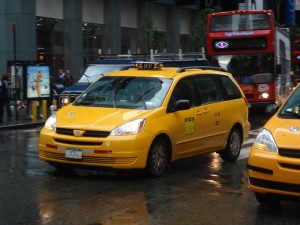Uber and the ride-sharing vs. registered taxis debate
by Beth
 You might remember that op-ed piece I wrote last April for the Chicago Tribune called “Should ride-sharing services adhere to the Americans with Disabilities Act?” Well, six months later, the ride-sharing vs. registered taxi driver issue is heating up all over the country. Another op-ed article –- this one called “The Dark Side of Uber and Lyft” — showed up in the Chicago Tribune this past week. Ride-sharing has become particularly popular In San Francisco, but an article in the San Francisco Chronicle raised concern that only 100 of the city’s 1,885 taxis are currently wheelchair accessible. And three plaintiffs in Houston and San Antonio have filed lawsuits against Uber and Lyft, claiming the companies violate the Americans with Disabilities Act.
You might remember that op-ed piece I wrote last April for the Chicago Tribune called “Should ride-sharing services adhere to the Americans with Disabilities Act?” Well, six months later, the ride-sharing vs. registered taxi driver issue is heating up all over the country. Another op-ed article –- this one called “The Dark Side of Uber and Lyft” — showed up in the Chicago Tribune this past week. Ride-sharing has become particularly popular In San Francisco, but an article in the San Francisco Chronicle raised concern that only 100 of the city’s 1,885 taxis are currently wheelchair accessible. And three plaintiffs in Houston and San Antonio have filed lawsuits against Uber and Lyft, claiming the companies violate the Americans with Disabilities Act.
No decision on those Texas law suits yet, but perhaps it’s due to concerns from the disability community that Uber launched UberASSIST last month? Uber Assist gives people like me, who have visual impairments, or others, who use wheelchairs, the opportunity to notify drivers of our disabilities before they come pick us up. The idea is that people with disabilities who alert drivers ahead of time will get paired with a driver who can accommodate special needs — an Uber blog post explains that “UberASSIST vehicles are driven by trained UberX partners who are knowledgeable of accessibility needs and can offer assistance for those who may require extra help.”
The post says these vehicles can accommodate folding wheelchairs but are not wheelchair accessible ramp vehicles. Uber says that it will provide options for wheelchair-users who need wheelchair-accessible vehicles with lifts or ramps in the future, but it sure is hard to imagine how that would work: Companies like Uber use freelancers who drive their own vehicles, and freelancers don’t often drive vehicles with ramps and lifts on them.
As for guide dogs, Uber does not have a policy about whether or not their drivers will allow people who use service animals in their cars. The only reference to animals in their policy statement is one that says they “leave the decision whether or not to transport pets at the discretion of your driver.”
Since Uber cars are privately owned and operated by independent contractors, they don’t have to follow the Americans with Disabilities Act (ADA). The ADA says “public transportation authorities may not discriminate against people with disabilities in the provision of their services” but it doesn’t say anything about private rides.
In addition to launching UberAccess last month, Uber also announced plans to help reduce the high unemployment rate among military families by hiring 50,000 service members, veterans, and their spouses in the next year and a half. I’m all for hiring veterans and their families, but after the little research I’ve done to write this blog post, I’ve gotta wonder if any of America’s 3.6 million veterans who have been injured serving our country will be able to access the Uber services their fellow vets will be providing. We hope so! What do you think?






